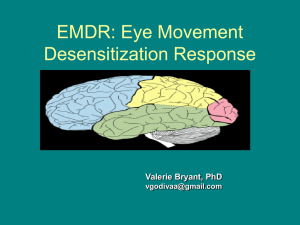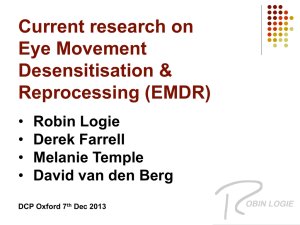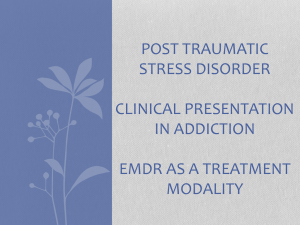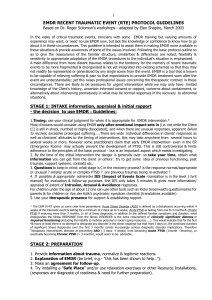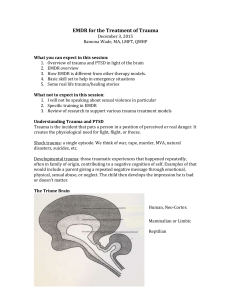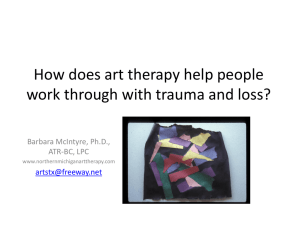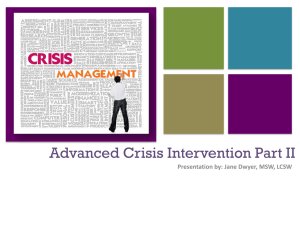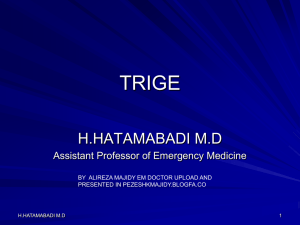draft for emdr europe consultant training
advertisement
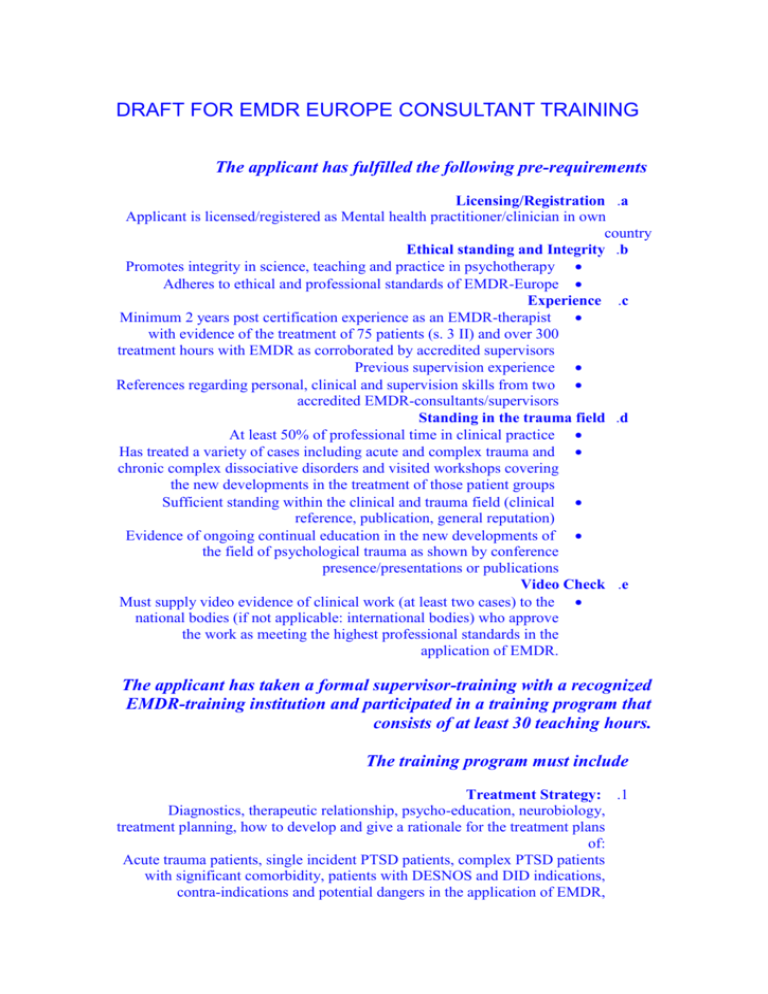
DRAFT FOR EMDR EUROPE CONSULTANT TRAINING The applicant has fulfilled the following pre-requirements Licensing/Registration .a Applicant is licensed/registered as Mental health practitioner/clinician in own country Ethical standing and Integrity .b Promotes integrity in science, teaching and practice in psychotherapy Adheres to ethical and professional standards of EMDR-Europe Experience .c Minimum 2 years post certification experience as an EMDR-therapist with evidence of the treatment of 75 patients (s. 3 II) and over 300 treatment hours with EMDR as corroborated by accredited supervisors Previous supervision experience References regarding personal, clinical and supervision skills from two accredited EMDR-consultants/supervisors Standing in the trauma field .d At least 50% of professional time in clinical practice Has treated a variety of cases including acute and complex trauma and chronic complex dissociative disorders and visited workshops covering the new developments in the treatment of those patient groups Sufficient standing within the clinical and trauma field (clinical reference, publication, general reputation) Evidence of ongoing continual education in the new developments of the field of psychological trauma as shown by conference presence/presentations or publications Video Check .e Must supply video evidence of clinical work (at least two cases) to the national bodies (if not applicable: international bodies) who approve the work as meeting the highest professional standards in the application of EMDR. The applicant has taken a formal supervisor-training with a recognized EMDR-training institution and participated in a training program that consists of at least 30 teaching hours. The training program must include Treatment Strategy: .1 Diagnostics, therapeutic relationship, psycho-education, neurobiology, treatment planning, how to develop and give a rationale for the treatment plans of: Acute trauma patients, single incident PTSD patients, complex PTSD patients with significant comorbidity, patients with DESNOS and DID indications, contra-indications and potential dangers in the application of EMDR, stabilization techniques, self-care, ethics and EMDR, oorganization of health care and major international organizations in the field of psychological trauma Teaching format: lectures, video, manuals, exercises EMDR protocol: .2 Evidence base of the EMDR-protocols, Standard and often used experimental EMDR-protocols and their indications, Cognitions, procedure, closing techniques, safe place, resource development, interweaves, phobia protocol, special techniques for complex trauma ( wedging, affect bridge, container, resource focusing, circling, absorption technique), how to deal practically with a decompensated trauma patient Teaching format: lectures, video, manuals, role play, minilectures Supervisor skills,: .3 Supervised supervision (at least 10 hours) Attitude, pacing and dosing, common mistakes of beginners in the use of EMDR and how to deal with them, difficult supervisees Teaching format: lectures, video, manuals, role play, minilectures Duration: The certification lasts for 5 years and is renewable if the above conditions still apply and if the applicant provides evidence of 25 hrs of continual education in the EMDR-Method to the national body Treatment Strategy: .4 Teaching format: lectures, video, manuals, exercises Overview and Diagnostics Trauma-Models, Etiology o Neurobiology o Type 1 and Type 2 Traumatization o Acute and chronic Traumatization o DSM IV and ICD 10: o Acute stress Disorder .i Adjustment Disorder .ii PTSD .iii Dissociative Disorders .iv Co-Morbidity .v Psycho-education Illusions of safety o Characteristics of trauma o Trauma-responses o Self-healing system o Treatment planning Therapeutic relationship o Transference and Counter-transference Treatment frames, principles, and boundaries Phases of Treatment o Stabilization techniques .i Container Safe place Inner helper etc. Trauma-confrontation techniques besides EMDR .ii Hypnotherapeutic techniques o Cognitive-behavioral o Integration phase .iii How to develop and give a rationale for the treatment plans of: Acute trauma patients o Single incident PTSD patients o Complex PTSD patients with significant co morbidity o Patients with DESNOS and DID indications o Contra-indications and potential dangers in the application of EMDR Self-care for trauma therapists Ethics and EMDR Organization of health care and major international organizations in the field of psychological trauma EMDR protocol: Teaching format: lectures, video, manuals, role play, mini-lectures Evidence base of the EMDR-protocols Literature o Research o Books o Standard EMDR-protocol and procedure Setting .1 Bilateral stimulation techniques .2 Target selection .3 Present Past Future Assessment .4 Image Negative cognition positive cognition VoC Emotions SUD Body location Processing (Desensitization) .5 Installation of positive cognition .6 Body scan .7 Closing techniques .8 Complete session Incomplete session Reevaluation .9 Strategies for blocked processing .10 Blocking Beliefs .11 Interweaves .12 Often used additional and experimental EMDR-protocols and their indications Safe place .1 Resource development .2 Resource focusing .3 Wedging, absorption technique .4 Float back technique (affect bridge) .5 Phobia protocol .6 Protocol for children .7 Protocol for acute trauma .8 Special techniques for complex trauma .9 How to deal practically with a decompensated trauma patient Supervisor skills: .5 Teaching format: lectures, video, manuals, role play, minilectures Supervised supervision (at least 10 hours) Attitude Pacing and dosing Common mistakes of beginners in the use of EMDR and how to deal with them Difficult supervisees Introduction of resourcing techniques Supervision of self-experiencing vignettes Difficulties in “mixed – groups” of therapists: Adult – children therapists Cognitive-behavioral – psychodynamic therapist Body therapists
